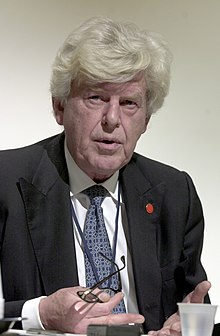
Back فيم دوسينبيرغ Arabic فيم دوسينبيرج ARZ Вим Дойсенберг Bulgarian Wim Duisenberg Catalan Wim Duisenberg Danish Wim Duisenberg German Βιμ Ντούιζενμπεργκ Greek Wim Duisenberg Esperanto Wim Duisenberg Spanish Wim Duisenberg Basque
This article's lead section contains information that is not included elsewhere in the article. (August 2022) |
Wim Duisenberg | |
|---|---|
 Wim Duisenberg in 2001 | |
| President of the European Central Bank | |
| In office 1 June 1998 – 31 October 2003 | |
| Vice President | Christian Noyer Lucas Papademos |
| Preceded by | Position established |
| Succeeded by | Jean-Claude Trichet |
| President of the European Monetary Institute | |
| In office 1 July 1997 – 1 June 1998 | |
| Preceded by | Alexandre Lamfalussy |
| Succeeded by | Position abolished |
| President and Chairman of the Bank for International Settlements | |
| In office 1 January 1994 – 1 July 1997 | |
| General-Manager | Andrew Crockett |
| Preceded by | Bengt Dennis |
| Succeeded by | Alfons Verplaetse |
| In office 1 January 1988 – 31 December 1990 | |
| General-Manager | Alexandre Lamfalussy |
| Preceded by | Jean Godeaux |
| Succeeded by | Bengt Dennis |
| President of De Nederlandsche Bank | |
| In office 1 January 1982 – 1 July 1997 | |
| Preceded by | Jelle Zijlstra |
| Succeeded by | Nout Wellink |
| Member of the House of Representatives | |
| In office 16 January 1978 – 28 June 1978 | |
| In office 8 June 1977 – 8 September 1977 | |
| Parliamentary group | Labour Party |
| Minister of Finance | |
| In office 11 May 1973 – 19 December 1977 | |
| Prime Minister | Joop den Uyl |
| Preceded by | Roelof Nelissen |
| Succeeded by | Frans Andriessen |
| Personal details | |
| Born | Willem Frederik Duisenberg 9 July 1935 Heerenveen, Netherlands |
| Died | 31 July 2005 (aged 70) Faucon, France |
| Cause of death | Drowning |
| Political party | Labour Party (from 1959) |
| Spouses | |
| Children | Pieter Duisenberg (born 1967) one other son and daughter |
| Alma mater | University of Groningen (BEc, M.Econ, PhD) |
| Occupation | Politician · civil servant · Economist · Researcher · Businessperson · Banker · Corporate director · Lobbyist · Author · professor |
| Signature |  |
Willem Frederik "Wim" Duisenberg (Dutch: [ˈʋɪləm ˈfreːdərɪk ʋɪm ˈdœysə(m)bɛr(ə)x] ; 9 July 1935 – 31 July 2005) was a Dutch politician and economist who served as President of the European Central Bank from 1 June 1998 until 31 October 2003. He was a member of the Labour Party (PvdA).[1]
Duisenberg studied Economics at the University of Groningen obtaining a Master of Economics degree and worked as a researcher at his alma mater before finishing his thesis and graduated as a Doctor of Philosophy in Development economics. Duisenberg worked as a financial analyst for the International Monetary Fund (IMF) from January 1966 until March 1969 and as an economist for the Dutch central bank (DNB) from March 1969 until February 1970. Duisenberg worked as a professor of Macroeconomics at the University of Amsterdam from February 1970 until May 1973. After the election of 1972 Duisenberg was appointed as Minister of Finance in the Cabinet Den Uyl taking office on 11 May 1973. The Cabinet Den Uyl fell just before the end of its term. After the election of 1977 Duisenberg was elected as a Member of the House of Representatives serving from 8 June 1977 until 8 September 1977 and again from 16 January 1978 and served as a frontbencher and spokesperson for Finances. In June 1978 Duisenberg unexpectedly announced his retirement and resigned from the House of Representatives on 28 June 1978. Duisenberg semi-retired from active politics at just 42 and became active in the private sector as a corporate director, and worked as a banker for the Rabobank. In November 1981 Duisenberg was nominated as the next President of the Central Bank taking office on 1 January 1982. In June 1997 Duisenberg was nominated as the next President of the European Monetary Institute (EMI), taking office on 1 July 1997. In May 1998 the EMI was reformed to the European Central Bank (ECB) with Duisenberg appointed as the first President of the European Central Bank serving from 1 June 1998 until 31 October 2003.
Duisenberg retired from active politics a second time at 68 and became active again in the private and public sectors as a corporate and non-profit director and served on several state commissions and councils on behalf of the government. Following his retirement Duisenberg continued to be active as an advocate and lobbyist for balanced governmental budgets, financial regulation and more European integration. Duisenberg was known for his abilities as a skillful manager and effective negotiator and continued to comment on political affairs until his death after suffering a heart attack and drowning in a swimming pool in July 2005 at the age of 70. He holds the distinction as the youngest-serving Dutch Minister of Finance at the age of 37 years, 306 days.[2][3]
- ^ "Wim Duisenberg (70) overleden". RTL Nieuws. 2005.
- ^ "Zalm op een na beste minister van Financiën" (in Dutch). Trouw. 1 November 2006. Retrieved 21 July 2017.
- ^ "Verkiezing van de Beste Minister van Financiën" (in Dutch). Historisch Nieuwsblad. 15 May 2009. Retrieved 21 July 2017.
© MMXXIII Rich X Search. We shall prevail. All rights reserved. Rich X Search